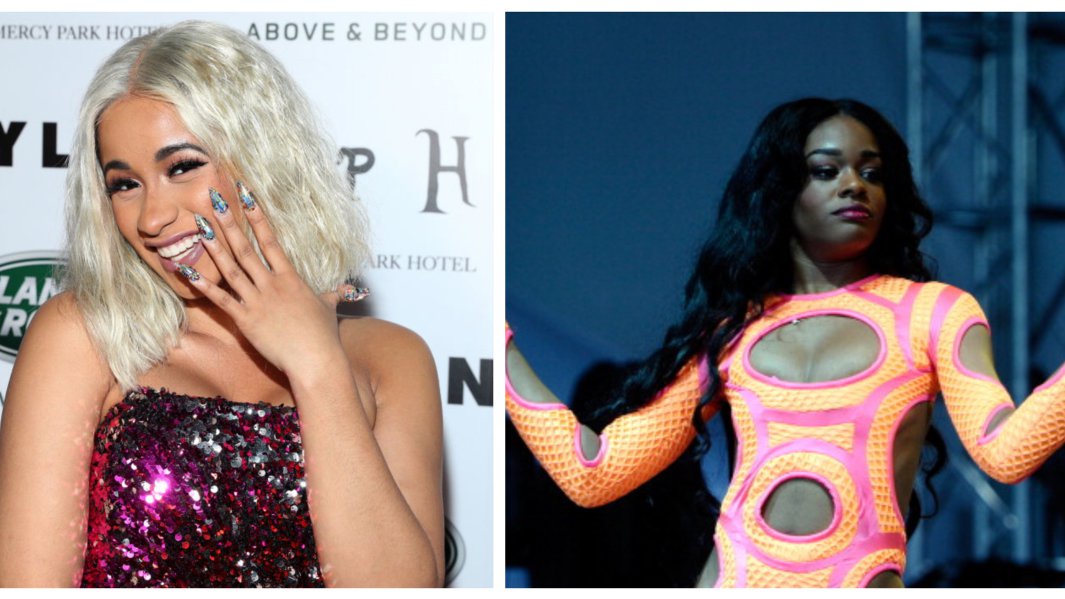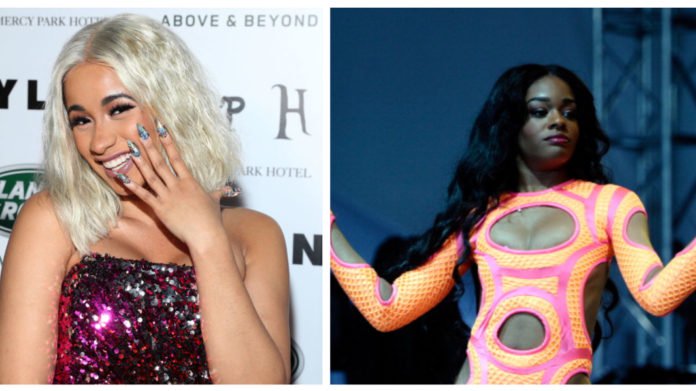[ad_1]
“Love & Hip Hop New York” standout reborn as rap gawdess Cardi B is not everybody’s jam.
Her bird-like sound effects, twerk-team tendencies, and unabashed love for all things Offset have helped catapult her from reality TV to Billboard fame and into mainstream fandom.
Still, there are folks who visibly cringe every time she utters “Eee-yoowwwww” and the now-SNL appropriated “Okkkurrr!” Others wonder aloud how her hits “Bodak Yellow” and the Migos-assisted “Drip, Drip” clambered atop the charts within the same timeline that awarded Kendrick Lamar a Pulitzer Prize.
One of those detractors is rapper and self-appointed hip-hop Thanos: Azealia Banks.
“Two years ago, the conversation surrounding Black women’s culture was really reaching an all-time high,” Banks told the Breakfast Club in a now infamous interview. “There was just this really, really, really intelligent conversation going on nationally and then everything just kind of changed and then it was like Cardi B.”
The finishing move came when Banks called the Bronx -bred rapper a “caricature of a Black woman,” implying that her peer’s light-skin and Latinx heritage automatically provides Cardi with preferred treatment.
“If my spelling and grammar was that bad, I would be canceled,” Banks pointed out. “If Nicki Minaj spelled like that, we would be ragging on her all day.”
Welp, we probably better skip over the grammatical error Banks herself made in that first sentence and get to the part in which she just may have somewhat of a point.
In an online rebuttal, the “Invasion of Privacy” artist first pulled from the Book of Diddy and cloaked herself in her own success, pointing out Banks’ inability to profit significantly from her own art.
READ. HER. CARDI pic.twitter.com/AHWXL2vRLh
— tony (@gawdcompIexx) May 12, 2018
Unfortunately, in doing so, Cardi B, revealed her artistic Achilles’ heel: “I’m from the hood. I speak how I speak I am how I am. I did not choose to be famous people choose me!”
Yes, “people” did choose Cardi, but the question is why?
I would never suggest she didn’t earn her fame. Most of her music is a bop and, within it, she wields a unique style of speech exalted in other rappers from Snoop Dogg to Lil’ Kim to the Notorious B.I.G and beyond. She most certainly deserves a place on current music charts that make space for Lil’ Pump, G-Eazy, Kodak Black, French Montana and the abominable, Post Malone.
READ MORE: This Is America: 5 powerful messages that will stay with you long after your Donald Glover hangover
Yet, her rise does say something about what mainstream society chooses to extract from The Culture. I’m willing to bet that quite a few swimming up the mainstream didn’t come close to understanding what Donald Glover was trying to say through his “This is America” visuals and were instead focused on fine-tuning their “shooter” and “gwara gwara” dances for the ‘Gram before they were rudely interrupted by about a million thinkpieces about the video’s searing symbolism.
READ MORE: Nordstrom under fire after police called on Black teens falsely accused of shoplifting prom clothes
Going back even further, consider all of the philosopher stone-level science comic Dave Chappelle was dropping on “Chappelle’s Show” back in the day. Somehow, all the Culture Vultures came away with was the catchphrase, “I’m Rick James, bitch!”
In Chappelle’s case, he sensed some of the public was laughing at him and not with him, so he dropped his show and (for a bit) his residency in the United States.
In Cardi B’s case, she went private on Twitter and effectively evaporated off of Instagram, the platform that helped make her a household name in the first place. Banks, once clowned by Cardi for criticizing her meanwhile bopping to “Bodak Yellow,” won this round. It’s likely not to hold though.
Banks is far from an empowering force for female artists. She has beefed (albeit one-sidedly) with Beyonce, been petty enough to spar with then 14-year-old Disney Star Skai Jackson and even once took it to Rihanna’s Navy. She has voiced support for the scourge known as 45 and, as Cardi B. pointed out and stanned for skin-bleaching products to use on her deep chocolate skin.
In coming days, most of those facts will wash away the damning points Banks made about why the Patron Saint of Parrot Noises is on top.
READ MORE: #YaleWhileBlack: White woman calls police on Black grad student for napping in dorm
Cardi B. will most likely be back to digital domination (perhaps after her daughter is born) as the sting of this roast fades and her fans demand more Cardi content.
We, however, will still be left with uncomfortable questions about how America cherry picks from our Black celebrities and why certain artists can “be themselves” and make money while others, who don’t play easily into stereotypes or tropes are ethered or, in Banks’ case, ignored.
Kyra Kyles is a multiplatform media executive, author, and speaker on media diversity. In addition to her 20-plus years as a journalist, including a tenure as Editor-in-Chief of EBONY, the Chicago-based co-founder of Myth Lab Entertainment is a filmmaker who co-produced/wrote/directed “Human Resources Season 2: Cubicle Creepshow,” a Web series that explores what happens when workplace horror stories meet monster movie classics. Follow Kyra @thekylesfiles on Instagram, Facebook, and Twitter.
[ad_2]
Source link


